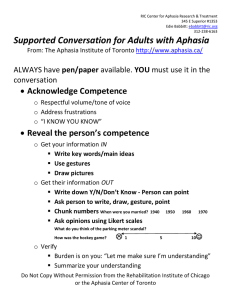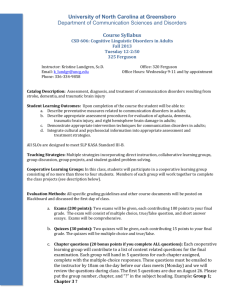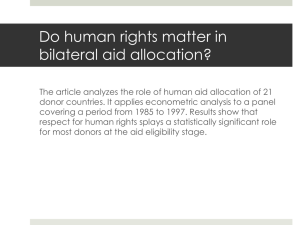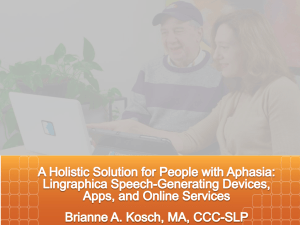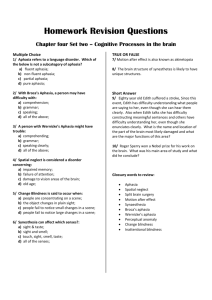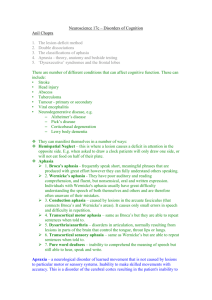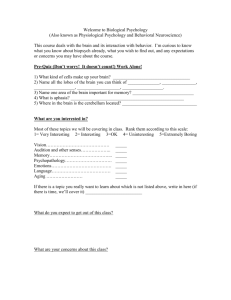191 California State University, Fresno Department of Communicative Disorders and Deaf Studies
advertisement
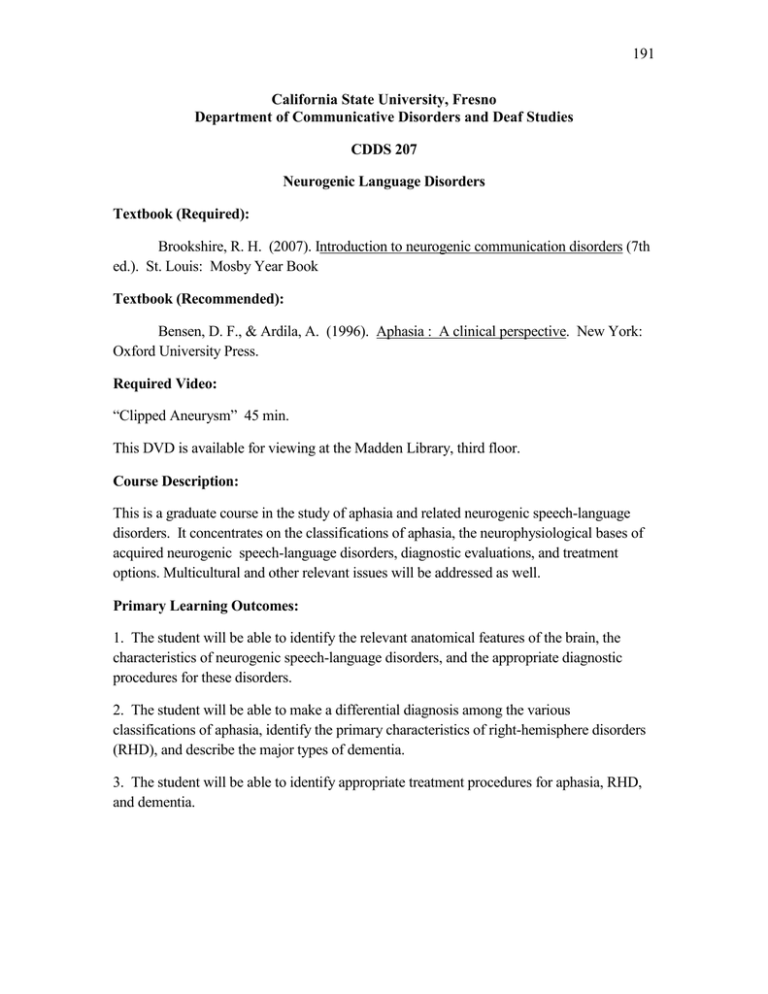
191 California State University, Fresno Department of Communicative Disorders and Deaf Studies CDDS 207 Neurogenic Language Disorders Textbook (Required): Brookshire, R. H. (2007). Introduction to neurogenic communication disorders (7th ed.). St. Louis: Mosby Year Book Textbook (Recommended): Bensen, D. F., & Ardila, A. (1996). Aphasia : A clinical perspective. New York: Oxford University Press. Required Video: “Clipped Aneurysm” 45 min. This DVD is available for viewing at the Madden Library, third floor. Course Description: This is a graduate course in the study of aphasia and related neurogenic speech-language disorders. It concentrates on the classifications of aphasia, the neurophysiological bases of acquired neurogenic speech-language disorders, diagnostic evaluations, and treatment options. Multicultural and other relevant issues will be addressed as well. Primary Learning Outcomes: 1. The student will be able to identify the relevant anatomical features of the brain, the characteristics of neurogenic speech-language disorders, and the appropriate diagnostic procedures for these disorders. 2. The student will be able to make a differential diagnosis among the various classifications of aphasia, identify the primary characteristics of right-hemisphere disorders (RHD), and describe the major types of dementia. 3. The student will be able to identify appropriate treatment procedures for aphasia, RHD, and dementia. 192 Attendance and Grading: You will be expected to attend every class. Exams must be taken when scheduled by the instructor. Make-up tests will only be allowed in cases of extreme emergency. Written work must be submitted on time, no exceptions. 1st Midterm (50 pts.) 2nd Midterm (50 pts.) Final (50 pts) Term Paper (50 pts.) These tests will be mostly objective evaluations (e.g., T-F, MC, matching, short answer). Your final grade will be a percentage of your total points from all examinations and the term paper: 180-200 pts. = A 160-179 pts. = B 140-159 pts. = C 120-139 pts. = D 100-119 pts. = F Term Paper—You will write a 4000 word paper that examines one type of speech-language or cognitive treatment for aphasia, RHD, or dementia. The type of treatment must be a procedure that would be used by a speech-language pathologist. This paper must closely follow APA writing style and be fully referenced. Your grade will be based on the accuracy of your material, grammatical correctness, and clarity of your writing. This paper will be due approximately a month before the end of the semester. You will be given the exact due date weeks ahead of time. Course Calendar: (The sequence listed here is tentative and subject to change with advanced notice from the instructor.) Unit 1 Anatomy and Physiology Reading: Chapter 1, 2 193 Unit 2 Anatomy (continued) Reading: Chapter 1, 2 Unit 3 Overview of Neurogenic Communication Disorders Neurophysiology of Aphasia and Related Disorders Reading: Chapter 8 Unit 4 Neurophysiology of Aphasia and Related Disorders Reading: Chapter 8 FIRST MIDTERM Unit 5 Assessing Aphasia and Related Impairments Reading: Chapter 3, 5, 6 Unit 6 Assessing Aphasia and Related Impairments Reading: Chapter 3, 5, 6 Unit 7 Assessing Aphasia and Related Impairments Reading: Chapter 3, 5, 6 Unit 8 Treatment of Aphasia Reading: Chapter 7, 9 Unit 9 Treatment of Aphasia 194 Reading: Chapter 7, 9 Unit 10 Treatment of Aphasia Reading: Chapter 7, 9 Unit 11 Treatment of Aphasia Reading: Chapter 7, 9 Unit 12 Treatment of Aphasia Reading: Chapter 7, 9 SECOND MIDTERM Unit 13 Right Hemisphere Disorders Readings: Chapter 10 Unit 14 Dementia Readings: Chapter 12 Unit 15 Dementia Readings: Chapter 12 FINAL EXAMINATION Note 1: In accordance with procedures of the CSU, Fresno and the policy of the School of Health and Human Services, withdrawing from one or more classes after the second week of instruction can only be done for serious and compelling reasons. Failing or performing poorly in a class is not an acceptable serious and compelling reason within the university policy, nor is dissatisfaction with the subject matter, class, or instructor. A serious and 195 compelling reason typically includes a medical, emotional, or other highly extenuating circumstance that precludes completion of the course. Note 2: All tests must be taken at the assigned time. Make up test will only be given in cases of extreme emergencies. Tape recording lectures is permissible. Note 3: You are expected to attend every class. This course covers complex subject matter that may not be explained clearly in the reading materials alone. Note 4: Students with disabilities should identify themselves to the University. The instructor will make reasonable accommodation for learning and evaluation within the course. Note 5: This class will follow the University’s policy regarding conduct of courses, including cheating and plagiarism. These policies are located in the CSUF Catalog and Schedule of Courses. Note 6: Disruptive Classroom Behavior: "The classroom is a special environment in which students and faculty come together to promote learning and growth. It is essential to this learning environment that respect for the rights of others seeking to learn, respect for the professionalism of the instructor, and the general goals of academic freedom are maintained. … Differences of viewpoint or concerns should be expressed in terms which are supportive of the learning process, creating an environment in which students and faculty may learn to reason with clarity and compassion, to share of themselves without losing their identities, and to develop and understanding of the community in which they live . . . Student conduct which disrupts the learning process shall not be tolerated and may lead to disciplinary action and/or removal from class." Note 7: Plagiarism In a research paper, an author summarizes and critically evaluates published empirical research on a given topic. Such a paper involves rephrasing a vast amount of published information. In the past and especially in this class, students who have forgotten the APA style of giving credit to the authors of published article and books have been open to the charge of plagiaristic writing. Take note of the CSUF policy on cheating and plagiarism, which makes no reference to an intent to plagiarize (see the appropriate section in the CSUF catalog). See the APA Manual and the Coursebook on Scientific and Professional Writing on quotations, citations, and giving credit to other authors and sources. In the 5th edition of the APA Manual, see the indexed entry, plagiarism for specific information. A lack of knowledge on how to express information gathered from published sources may result in plagiaristic writing. A student who unknowingly indulges in plagiaristic writing does not know how to give credit to published sources and how to paraphrase other authors. In cases of plagiarism, the University policy will be followed. Also note that: 196 A lack of knowledge about what plagiarism is or is not is not an excuse under the University Policy. This and other instructors in the Department will not excuse plagiaristic writing when a student pleads that she or he did not know what constitutes plagiarism. Your attention is hereby drawn to this issue. If you are not sure what constitutes plagiaristic writing, you need to find out by reading the APA Manual, reviewing A Coursebook on Scientific and Professional Writing, 3rd edition (Hegde, 2003), and then by consulting with your instructors if you are still unclear. You must be prepared to submit copies or the originals of all sources (article, books, book chapters) that you cite in your paper for verification of original writing and accuracy of quotations. The University Catalog specifies that plagiaristic writing may result in dismissal, suspension, probation, or other sanctions along with a lower grade given regardless of the performance on the tests and examinations. The Department policy on plagiaristic writing, in addition to the University policy, is as follows: (a) any graduate student who plagiarizes will automatically receive a grade of C or lower for the course, and (b) plagiaristic writing will automatically result in a D or an F for the paper, depending on the extent of plagiaristic writing; this too, will negatively affect the grade. Note 8: The above schedule and procedures for this course are subject to change in the event of extenuating circumstances. 197 Term Paper You will write a 4000 word paper that examines one type of speech-language or cognitive treatment for aphasia, RHD, or dementia. The type of treatment must be a procedure that would be used by a speech-language pathologist. This paper must closely follow APA writing style and be fully referenced. Your grade will be based on the accuracy of your material, grammatical correctness, and clarity of your writing. This paper will be due approximately a month before the end of the semester. You will be given the exact due date weeks ahead of time. The paper will be graded according to the following criteria: 1. A reference list that contains at least 10 scientific articles from peer-reviewed journals (10 points). 2. The paper is organized in a coherent, logical manner; use of headings and subheadings is encouraged (10 points). 3. The paper follows APA rules for references, abbreviations, serialization, numbers, and so forth (10 points) 4. The paper includes reviews of key studies relevant to the treatment that are comprehensive and understandable (10 points). 5. The paper includes correct spelling, punctuation, and grammar (10 points).
